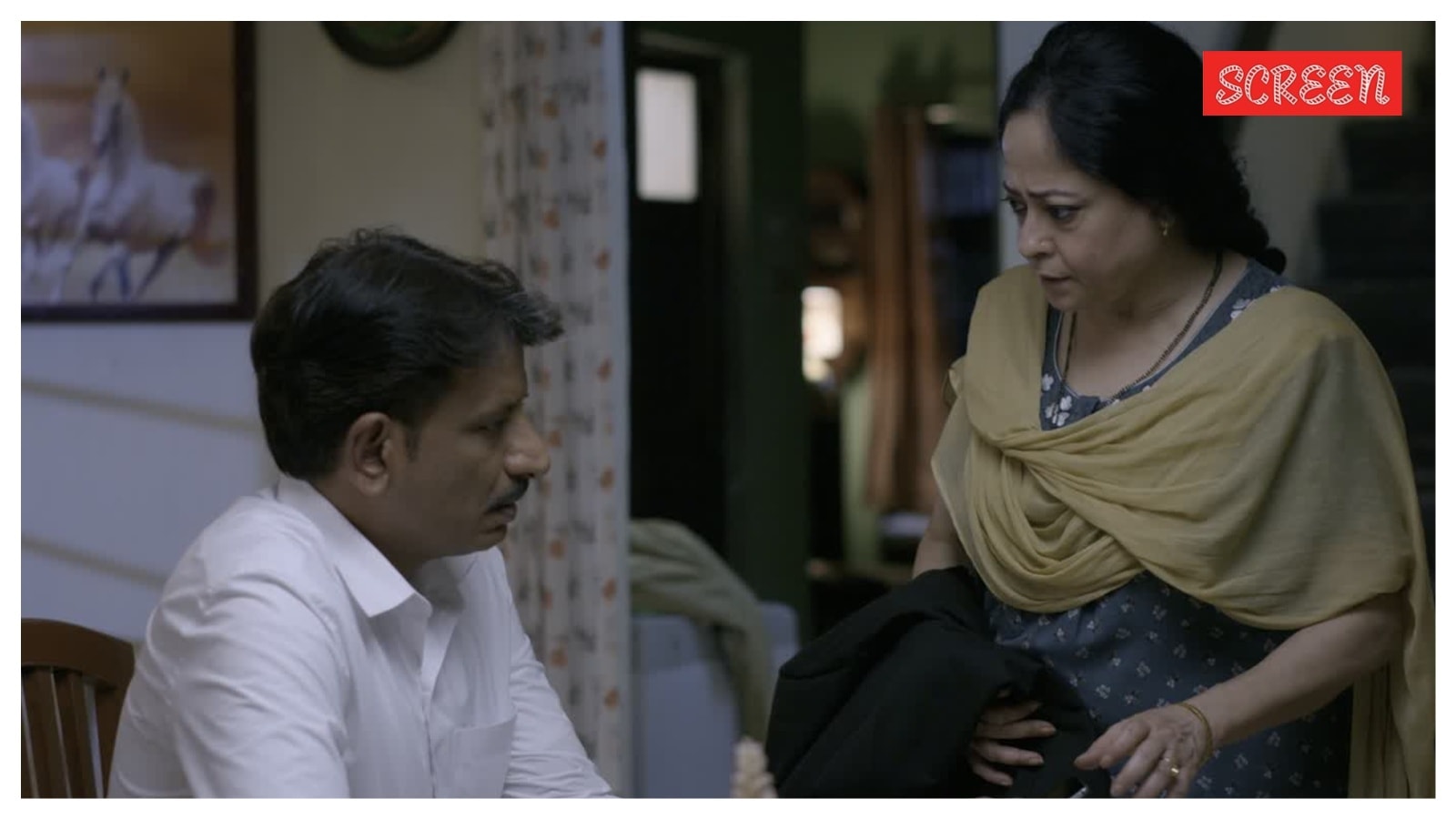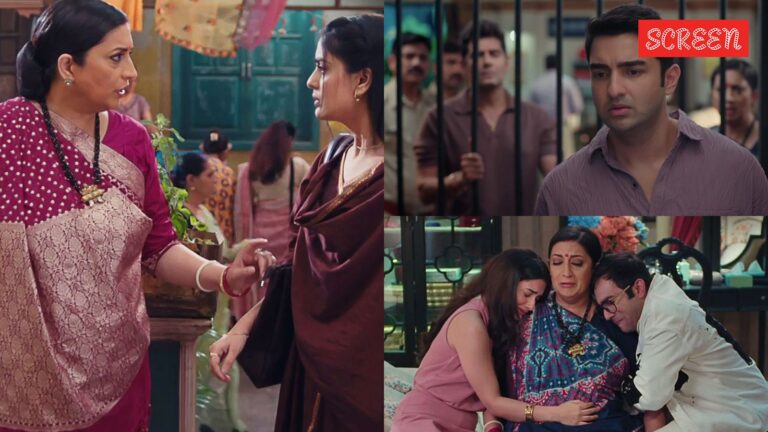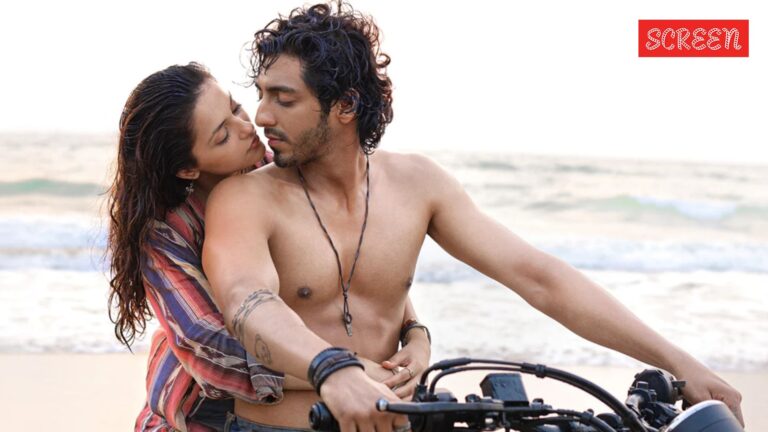We may have seen multiple memorable onscreen pairings in films, but have we really seen any enduring one on streaming? Rajesh Tailang and Sheeba Chaddha are emerging to be one. The two actors were paired with each other in successful shows like Mirzapur and Bandish Bandits on Prime Video India. Their most recent turn together is Ameet Guptha’s ZEE5 dramedy Bakaiti.
“It feels like home,” Tailang recalls what he felt like on the first day of shoot, and Chaddha agrees. “In the other two shows, it’s a matter of life and death. In Bakaiti, everything is with a pinch of salt. Sometimes, it’s also good to not take everything so seriously. The stories of the other two were such that we couldn’t handle those characters lightly,” points out Chaddha, in an exclusive interview with SCREEN.
Set in Ghaziabad, the show revolves around the Kataria family, in which Tailang plays a struggling lawyer and Chaddha a homemaker, who are trying to maintain their family, with two kids 17 and 21 years old respectively. Created by Dice Media, the show has a lightness of touch, unlike the other two the pair has done in the past.
“The conflicts are the challenges and the bakaiti (blabbering) of daily life that we all go through in any unit. There’s also depravation of resources, a classic middle-class issue. Certain kind of situations get generated out of that, which you’ve to battle and combat on an everyday basis, as we all do,” explains Chaddha.
Created by Dice Media, best known for Netflix India’s Little Things, Bakaiti was quick to warm up to, for both the actors. “The world dictates the tone. But in this case, we brought that sur from home. It’s so slice-of-life that it’s easy to get into it,” says Chaddha, adding, “You also keep fighting with family, but you know what the intent is. You know there’ll be another day. So you’re going along. Aisa nahi hai ki bachcha Guddu bhaiya ban jaega (laughs).”

Rajesh and Sheeba are both parents to daughters in real life, and they feel being a parent, whether on screen or off it, is never easy. “Becoming parent in any age or era is a difficult and responsible job. Our parents would’ve had to face the same hurdles as their parents did an as we do now. Earlier, it used to take 10-15 years for the generation gap to kick in. Now, it’s happening in merely five years! So it’s very difficult to catch up with the times,” says Tailang.
Chaddha, a single parent, nods and adds, “Every time you feel you’ve cracked it, comes another curveball. Being a parent tests you in every area of being. More so now, the way the world is, it’s very difficult to parent kids pre-puberty and post-puberty. It’s difficult for every generation, but I don’t think it’s been like how it’s now in the history of this world. These are crazy times.”
Story continues below this ad

Chaddha has made a career out of playing the mother. In most films, she’s your next-door mom who lacks cultural capital. Like it happens in Zoya Akhtar’s 2009 directorial debut Luck By Chance, Chaddha’s character is shamed in Bakaiti for her lack of English-speaking skills. A ‘well-meaning’ friend corrects her pronunciation of ‘elite,’ the embarrassment of not even being able to speak her aspiration accurately apparent on her face.
“Ideally, I try not to demonstrate or make it obvious, but to try and actually evoke the feeling. You just have to be as present as you are, which is the toughest to be as an actor. You can’t be that present in every moment,” confesses Chaddha, as Tailang claims she’s a master of ‘less for more,’ as also evident in her striking role in Harshvardhan Kulkarni’s 2022 coming-of-age comedy Badhaai Do. “It can’t be faked, that’s very tough. To show more than what you know is easy. But to show less than what you know is quite tough,” says Tailang.

In that film, she plays mother to Rajkummar Rao, who’s always mentally absent, but is completely present in the climax scene in which she cries and embraces her son for coming out. “It’s very easy to go the way that she’s a dimwit. But she’s not, she’s just reluctant. Dumb is easier to play. But she just wants others to do her job,” says Chaddha, who loves that her character is an oxymoron — a ‘reluctant mother.’
Thanks to that reluctance throughout the film, her being fully present in the terrace scene with Rao hits even harder. “I really don’t map my characters. I approach it scene by scene. What’s the truth of the scene we’re doing today? Let’s do that. I didn’t have the terrace scene in mind when I was filming the earlier scenes. This is just who she is. There comes a moment in that person’s life when she responds to it as a mother. Maybe that circumstance never arrived in her life before that,” says Chaddha.
Story continues below this ad

It’s interesting that in the spiritual prequel of that film, Amit R Sharma’s Badhaai Ho (2018), Sheeba played a diametrically opposite mother — one from South Delhi who doesn’t want her daughter (Sanya Malhotra) to marry into Ayushmann Khurrana’s family, which she refers to as a “circus she doesn’t want the tickets to.” “It was very enjoyable. It’s a short role, but very well-written. Good co-stars like Sanya and Ayushmann do half of your job. I’ve known women like that a lot. I’m from Delhi so I know that milieu,” says Chaddha.
Since she’d mostly played the desi mom roles prior to that, it wouldn’t have been surprising if an audience member walked up to her after and expressed their shock at her speaking fluent English. Like it happened with a filmmaker switching to Hindi while addressing Richa Chaddha at an award show after her portrayal of Najma in Anurag Kashyap’s 2012 crime epic Gangs of Wasseypur. Chaddha can’t recall any such incident, but has a valid advice. “Tell the audience to do some research also,” she says, laughing.
In another scene in Bakaiti, Tailang’s character boats of winning every legal case, “jab bhi milte hain” (whenever I get any). That kind of delusion is a part of every budding actor’s life too. Tailang and Chaddha’s careers were no different. “It’s a tough one. It’s easier said than done. I can understand how frustrating it can be. We still don’t know where our next gig would come from. But I don’t have an advice. Everyone found their own ways to sustain. I don’t think what worked for one would necessarily also work for the other. But hats off to those who’re able to keep at it. Otherwise it’s a good thing if your parents are rich,” says Chaddha, laughing.
She admits that for her, in the early days, film acting was just like going to daftar (office). “I was enjoying since day 1. But for me, it was always like an office you have to go. You usually enjoy the work, especially when it’s mazedaar, because we’ve all done pathetic roles too. I pray to God all of them get wiped off the audience’s memory. But you do that work because you’ve to pay rent. You’ve to be at it,” confesses Chaddha, who made her film acting debut with a small role in Sanjay Leela Bhansali’s 1999 blockbuster romantic drama Hum Dil De Chuke Sanam.
Story continues below this ad
Tailang, however, couldn’t sustain his acting career in Mumbai consistently because he wanted more. After graduating from National School of Drama in Delhi, he relocated to Mumbai and worked in the last three films of late legendary filmmaker Govind Nihalani — Hazaar Chaurasi Ki Maa (1998), Thakshak (1999), and Dev (2004). “In the 1990s, it was just assumed those who graduate from NSD had to be employed by either Shyam Benegal, Govind Nihalani or Ketan Mehta. That was the pool. I tried with all three, and it happened with Govind ji. But NSD gave me enough courage to come to Mumbai, otherwise I wouldn’t have,” recalls Tailang.
In his first film, Hazaar Chaurasi Ki Maa, he played Seema Biswas’ 62-year-old husband, when he was just 26. “I didn’t allow to get myself stereotyped. I did very few films and then left Mumbai. I started teaching at NSD because I wasn’t getting exciting work. I could survive, I also did a daily soap, but I wasn’t feeling involved internally,” says Tailang.
Evolving wasn’t a concern for Chaddha because she’d already found another avenue for that. “I never felt like I wasn’t evolving because I had no expectation of evolving from this medium. For me, I was from theatre and that was my main job. And films were just a daftar. Doing just that would be quite killing for a performer because we don’t get the kind of work we want to do in the beginning. Though the role in Bhansali’s film was fairly decent. I was quite lucky to get a role like that at that time. So, if there’s no avenue of creative release, then it can be very depressing. It’s very important to find your kind of people and work. Because if you’re doing bad work there too, then what’s the point? You’ve to find your groove in theatre too,” says Chaddha
Theatre in Mumbai wasn’t that avenue for Tailang because there was a paucity of plays in Hindi. “There were barely one or two groups doing that in the 1990s. Now, there are quite a few. I was also familiar with the Delhi theatre scene. I’m still a Delhi-based actor. I believe we’re not bound by space and time. We, in fact, play around with them,” says Tailang, who returned to Mumbai years later with Richie Mehta’s Siddharth in 2013. “I also played a role in his first film, Amal (2007). I collaborated with him in another capacity because I wrote the Hindi dialogues of Amal and Siddharth. So we’ve been friends since then,” he adds.
Story continues below this ad

Tailang reunited with Mehta on Delhi Crime, their International Emmy Award-winning police procedural on Netflix India. “I’ve seen immense growth in him. He works on his script and research all the time, for years. Even for a fictional film, not based on a real incident, he does a lot of research even for that,” says Tailang. Was playing a supporting role in a show led by women (Shefali Shah and Rasika Dugal) a concern for him? As he gives it a thought, Chaddha chimes in: “No no, he’d paid the producers to keep him in the show, around so many girls.”
“This is the first time this question has cropped up in my mind. I just see it as a character. It has nothing to do with gender. Maybe that’s a statement on part of the makers. But as an actor, I just see a character as a character,” says Tailang. He also has a message for male actors who feel insecure of women headlining shows: “If they feel like that on screen, then they may have similar issues in life also.”
Both Chaddha and Tailang are streaming stars today because they also leaned a bit on television in early days. Tailang, who was a part of India’s first daily soap Shanti, recalls the experience of shooting being similar to a theatre group. “It had actors from theatre, particularly Marathi theatre. We had a three-camera setup and we used to perform long scenes just like theatre. It was pre-Balaji period, as I like to call it.”
Story continues below this ad
Chaddha also sneaked in some good television, including Hip Hip Hurray and Antaraal, a show also featuring late actor Om Puri, before she succumbed to the post-Balaji era. “Once the daily soaps came in, I never enjoyed doing that kind of television,” admits Chaddha. Tailang feels an actor in love with their profession will find their audience. “If you love acting, you’d do it in any form, whether you reach 5,000 people or five. Survival is a different battle, but to hold the desire to reach your audience and find ways to do that is different altogether,” he says. Chaddha approves and concludes, “Spoken like an NSD teacher.”






















